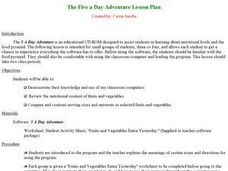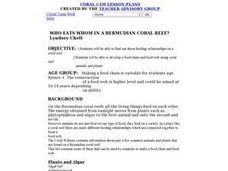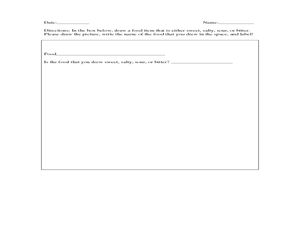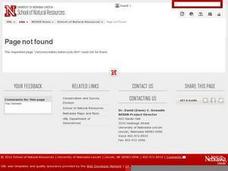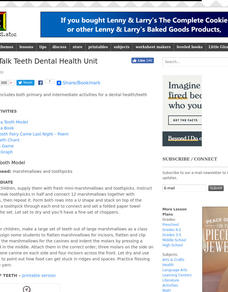Curated OER
The Five a Day Adventure Lesson Plan
Students, after examining a food pyramid, demonstrate their knowledge and use of their classroom computers by researching the nutritional content of fruits and vegetables. They also compare/contrast serving sizes and nutrients in...
Curated OER
Who Eats Whom in a Bermudian Coral Reef?
Students will be able to find out about feeding relationships on a coral reef. They then will be able to develop a food chain and food web using coral reef animals and plants using the Coral Website.
Curated OER
Habitat
Young scholars are able to define habitat. They are able to identify the four things that living things need to survive. Students are able to describe how living things are adapted to their habitats.
Curated OER
Terrific Taste Buds
Learners explore descriptive writing by eating food in class. In this descriptive word lesson, students assess different foods in class such as jelly beans and utilize their vocabulary to describe the taste. Learners read the story...
Curated OER
The State of the Planet
Students address four different environmental topics (water issues, the threat of food shortages, human population growth, and global warming) as they watch a film and discuss the future of the earth. In groups, they complete various...
Curated OER
How Much?
Fifth graders problem solve to determine if a fundraiser will be successful in the money raising activity. For this problem solving lesson, 5th graders read a book about fund raising and write down important vocabulary words. Students...
Curated OER
Plate and Planet
Students investigate the health hazards of modern agriculture and how we can choose better food options. In this healthy eating lesson, students identify different indigenous people in photographs and discuss what they might eat....
Curated OER
The Solar System: Why do we Explore?
Third graders act as scientists. In this property discovery lesson, 3rd graders explore the substance "Oobleck" (cornstarch, water, food coloring). They work in groups to investigate the substance and make observations as a scientist...
Curated OER
St. Patrick's Day Snack
First graders decide on and prepare a nutritious snack that is green.
Curated OER
South Dakota Quarter Reverse: Four Famous Faces
Students recognize the faces of the four presidents on the South Dakota quarter reverse. After discussing the duties and responsibilities of presidents, they list the contributions of the four presidents. They decide which presidents are...
Curated OER
Cancer-Fighting Foods and Health
Pupils will locate designated URL's to learn more about cancer protective foods. They will inventory their own dietary habits and that of their family to see which of these foods they have eaten and which are regular parts of their diet.
Curated OER
Mayan Farming Practices
The introduction of this lesson requires reading a from The Maya by Jaqueline Dembar Greene. Learners sketch a Mayan during the reading. Teaching strategies include direct instruction, grouping the young scholars for discussions,...
Virginia Department of Education
Using Subject-Verb Agreement with Intervening Phrases and Clauses
Learners practice subject-verb agreement in a practical activity. As a class, they see examples of subject/verb agreement provided by the instructor. In groups, they assemble the provided subject/verb cards and make creative sentences...
Curated OER
Let's Talk Teeth
Complete a number of activities in this group of lessons about dental health and teeth. Your elementary students will like the projects like making teeth models, reading a book, writing poetry and diagramming teeth.
Curated OER
Travel to Europe
Students work in small groups to plan an imaginary trip to Europe, including Germany. They research travel routes, prices and popular sights of each destination. Students assemble a booklet describing their itinerary, budget, packing...
Curated OER
Water Filtration
Learners demonstrate the four of five procedures that municipal water plants use to purify water for drinking. A water filtration system is designed by a student and their partner. A data chart is made to record all observations when the...
Curated OER
A Honey of a Hexagon
Students explore how bees make honey and why the hexagon is the best basic pattern for the honeycomb through the use of a video and hands-on activities with honeycombs and geometric shapes.
Curated OER
Discovering Math: Computation
Middle schoolers add, subtract, multiply, and divide rational numbers. They find the square and the cube of numbers. They create a game incorporating computation on rational numbers. Everyone works together to write and evaluate...
Curated OER
Soil Scrolls
Third graders examine soil samples and explore the what happens in each layer of the subsoil. They work in cooperative groups to create a scroll that shows what takes place in each layer, and discuss why much of the activity is in the...
Curated OER
A Taste of Our Classroom
Young scholars explore their classroom tastes. For this lesson plan, students list the four tastes that the tongue can detect, map the individual areas of taste on the tongue, and demonstrate the ability to identify objects through the...
Curated OER
You Are What You Eat (Grades 5-8)
Students gain an enhanced understanding of the relationship between proper nutrition and good health. Through use of video, hands-on activities and interaction, students measure energy in food, and recognize sources of vitamins and...
Curated OER
Good Health
Students complete a unit with cross-curricular activities to learn about a healthy body and maintaining their health. In this health lesson, students complete 8 lessons to learn about good health, a healthy diet, healthy foods, healthy...
Curated OER
Shedding Light on Watersheds
Students discuss what a watershed is, complete online activities showing them how to take care of a watershed, and create a model of a watershed that they experiment with to see what happens when it is disrupted by civilization.
Overcoming Obstacles
Clarifying Values
Encourage thoughtful decision making with a lesson that highlights the importance of values. Scholars take part in a grand conversation, listen to stories, and make decisions based on their personal values.
